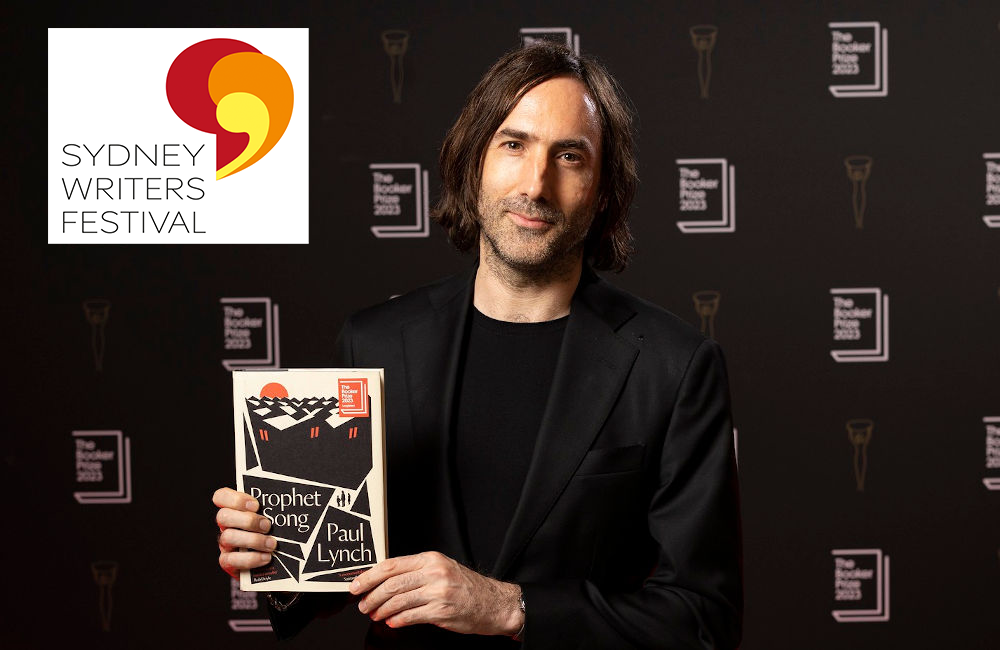I have a confession to make — I had never heard of Paul Lynch before attending his talk at the Sydney Writers’ Festival. I know, I know — it’s practically sacrilege to admit such a thing about the 2023 Booker Prize-winner, especially when he’s discussing his acclaimed novel Prophet Song (2023). But there I was, clueless yet intrigued enough to attend the event and experience the buzz for myself.
With a wry smile, Paul Lynch marveled at the media frenzy surrounding his visit: “I got a text this morning from Donald Ryan that just read, ‘What the fuck is going on down under?’” Lynch recounted how a shopping trip for hair products had become an international incident, “I had frizzy hair, and it became an international incident.”
Michael Williams, editor of The Monthly, set the tone for the evening, describing it as a collective therapy session for Prophet Song readers. He opened by saying, “I’m here for all of you, because we all have grievances against this man,” sparking laughter and camaraderie among the audience. Williams’ playful indignation was a fitting prelude to Lynch’s blend of humor and profound insight.
As the conversation progressed, Lynch delved into the arduous journey of writing Prophet Song. “The rational part of me believed I was dooming my career,” he confessed. “Though I had to write the book anyway. We do not have a choice in such matters.”
Lynch’s dedication to authenticity in his writing and his passion for storytelling shone through every word. “What you have inside you is a very small flame. And that flame is your authenticity. It is your essential self,” he explained. This flame, he emphasised, must be protected at all costs, even if it means commercial success remains elusive. Lynch’s commitment to authenticity resonated deeply, especially where the pressure to conform often stifles creative expression.
One of the most captivating aspects of the talk was Lynch’s exploration of the themes in Prophet Song. Set in a near-future Ireland, the novel depicts a society unravelling under a tyrannical government. Lynch described his fascination with the human condition and the irrational forces that drive us. “I’m interested in the human condition… turning truth inside out,” he said.
The protagonist Eilish, embodies this exploration, navigating the collapse of society while grappling with personal grief and the pressures of daily life. Lynch explained the relentless pacing and lack of paragraph breaks as a means to convey the claustrophobic inevitability of Eilish’s situation. “The book has no paragraph breaks, because there’s nowhere to turn, there’s no breathing room,” he noted.
Williams and Lynch’s dialogue also touched on broader cultural themes, such as desensitization in the age of spectacle. Lynch observed, “We become completely desensitized to what we’re seeing.” He contrasted this with the empathetic power of fiction, which can immerse readers in the intimate, everyday experiences of characters, fostering a deeper emotional connection.
Towards the end of the talk, Lynch’s reflections on grief were profound, and indicated an existential sense of urgency in both his works, and worldview. “Deep inside, there is a pain, and that pain is the awareness of death,” Lynch admitted.
Once the talk concluded, I found myself deeply moved and inspired. As a politics student, Lynch’s exploration of the human condition, and insightful commentary on the societal impacts of desensitization and grief left a lasting impression on me.
I immediately bought a copy of Prophet Song and joined the line to get it signed. When I finally reached Lynch, he glanced at my name and quipped that it was an amalgam of his mother’s and ex-wife’s names. This was a small moment, but one that became the highlight of my night.





